|
SNAP Library 2.0, Developer Reference
2013-05-13 16:33:57
SNAP, a general purpose, high performance system for analysis and manipulation of large networks
|
|
SNAP Library 2.0, Developer Reference
2013-05-13 16:33:57
SNAP, a general purpose, high performance system for analysis and manipulation of large networks
|
#include <agm.h>
Static Public Member Functions | |
| static void | GenPLSeq (TIntV &SzSeq, const int &SeqLen, const double &Alpha, TRnd &Rnd, const int &Min, const int &Max) |
| Generate sequence from Power law. | |
| static void | ConnectCmtyVV (TVec< TIntV > &CmtyVV, const TIntPrV &CIDSzPrV, const TIntPrV &NIDMemPrV, TRnd &Rnd) |
| Generate bipartite community affiliation from given power law coefficients for membership distribution and community size distribution. | |
| static void | GenCmtyVVFromPL (TVec< TIntV > &CmtyVV, const PUNGraph &Graph, const int &Nodes, const int &Coms, const double &ComSzAlpha, const double &MemAlpha, const int &MinSz, const int &MaxSz, const int &MinK, const int &MaxK, TRnd &Rnd) |
| Generate bipartite community affiliation from given power law coefficients for membership distribution and community size distribution. | |
| static void | GenCmtyVVFromPL (TVec< TIntV > &CmtyVV, const TIntV &NIDV, const int &Nodes, const int &Coms, const double &ComSzAlpha, const double &MemAlpha, const int &MinSz, const int &MaxSz, const int &MinK, const int &MaxK, TRnd &Rnd) |
| Generate bipartite community affiliation from given power law coefficients for membership distribution and community size distribution. | |
| static void | GenCmtyVVFromPL (TVec< TIntV > &CmtyVV, const int &Nodes, const int &Coms, const double &ComSzAlpha, const double &MemAlpha, const int &MinSz, const int &MaxSz, const int &MinK, const int &MaxK, TRnd &Rnd) |
| Generate bipartite community affiliation from given power law coefficients for membership distribution and community size distribution. | |
| static void | RndConnectInsideCommunity (PUNGraph &Graph, const TIntV &CmtyV, const double &Prob, TRnd &Rnd) |
| static PUNGraph | GenAGM (TVec< TIntV > &CmtyVV, const double &DensityCoef, const double &ScaleCoef, TRnd &Rnd=TInt::Rnd) |
| static PUNGraph | GenAGM (TVec< TIntV > &CmtyVV, const double &DensityCoef, const int TargetEdges, TRnd &Rnd) |
| static PUNGraph | GenAGM (TVec< TIntV > &CmtyVV, const TFltV &CProbV, TRnd &Rnd, const double PNoCom=-1.0) |
| static void | GetNodeMembership (THash< TInt, TIntSet > &NIDComVH, const TVec< TIntV > &CmtyVV) |
| get hash table of <Node ID, community IDs which node belongs to> | |
| static void | GetNodeMembership (THash< TInt, TIntSet > &NIDComVH, const TVec< TIntV > &CmtyVV, const TIntV &NIDV) |
| get hash table of <Node ID, community IDs which node belongs to>. Some nodes in NIDV might belong to no community | |
| static void | GetNodeMembership (TIntH &NIDComVH, const THash< TInt, TIntV > &CmtyVH) |
| get hash table of <Node ID, membership size> | |
| static void | GetNodeMembership (THash< TInt, TIntSet > &NIDComVH, const TVec< TIntSet > &CmtyVV) |
| static void | GetNodeMembership (THash< TInt, TIntSet > &NIDComVH, const THash< TInt, TIntV > &CmtyVH) |
| static void | GetNodeMembership (THash< TInt, TIntV > &NIDComVH, const THash< TInt, TIntV > &CmtyVH) |
| static void | GetNodeMembership (THash< TInt, TIntV > &NIDComVH, const TVec< TIntV > &CmtyVV) |
| static void | GetNodeMembership (TIntH &NIDComVH, const TVec< TIntV > &CmtyVV) |
| static void | LoadCmtyVV (const TStr &InFNm, TVec< TIntV > &CmtyVV) |
| load bipartite community affiliation graph from text file (each row contains the member node IDs for each community) | |
| static void | DumpCmtyVV (const TStr &OutFNm, const TVec< TIntV > &CmtyVV) |
| dump bipartite community affiliation into a text file | |
| static void | DumpCmtyVV (const TStr OutFNm, TVec< TIntV > &CmtyVV, TIntStrH &NIDNmH) |
| dump bipartite community affiliation into a text file with node names | |
| static int | TotalMemberships (const TVec< TIntV > &CmtyVV) |
| total number of memberships (== sum of the sizes of communities) | |
| static void | RewireCmtyVV (const TVec< TIntV > &CmtyVVIn, TVec< TIntV > &CmtyVVOut, TRnd &Rnd) |
| rewire bipartite community affiliation graphs | |
| static void | RewireCmtyNID (THash< TInt, TIntV > &CmtyVH, TRnd &Rnd) |
| rewire bipartite community affiliation graphs | |
| static int | Intersection (const TIntV &C1, const TIntV &C2) |
| static void | GetIntersection (const THashSet< TInt > &A, const THashSet< TInt > &B, THashSet< TInt > &C) |
| static int | Intersection (const THashSet< TInt > &A, const THashSet< TInt > &B) |
| static double | GetConductance (const PUNGraph &Graph, const TIntSet &CmtyS, const int Edges) |
| static void | GetNbhCom (const PUNGraph &Graph, const int NID, TIntSet &NBCmtyS) |
| static void | SaveGephi (const TStr &OutFNm, const PUNGraph &G, const TVec< TIntV > &CmtyVVAtr, const double MaxSz, const double MinSz) |
| static void | SaveGephi (const TStr &OutFNm, const PUNGraph &G, const TVec< TIntV > &CmtyVVAtr, const double MaxSz, const double MinSz, const THash< TInt, TStr > &NIDNameH) |
| static void | SaveGephi (const TStr &OutFNm, const PUNGraph &G, const TVec< TIntV > &CmtyVVAtr, const double MaxSz, const double MinSz, const THash< TInt, TStr > &NIDNameH, const THash< TInt, TIntTr > &NIDColorH) |
| save graph into a gexf file which Gephi can read | |
| static void | SaveBipartiteGephi (const TStr &OutFNm, const TIntV &NIDV, const TVec< TIntV > &CmtyVV, const double MaxSz, const double MinSz, const TIntStrH &NIDNameH, const THash< TInt, TIntTr > &NIDColorH, const THash< TInt, TIntTr > &CIDColorH) |
| save bipartite community affiliation into gexf file | |
| static int | FindComsByAGM (const PUNGraph &Graph, const int InitComs, const int MaxIter, const int RndSeed, const double RegGap, const double PNoCom=0.0, const TStr PltFPrx=TStr()) |
| estimate number of communities using AGM | |
| template<class PGraph > | |
| static PGraph | LoadEdgeListStr (const TStr &InFNm, TIntStrH &NIDNameH, const int &SrcColId=0, const int &DstColId=1, const TSsFmt SsFmt=ssfTabSep) |
| template<class PGraph > | |
| static void | GVizComGraph (const PGraph &Graph, const TVec< TIntV > &CmtyVV, const TStr &OutFNm, const TStr &Desc=TStr()) |
| void TAGMUtil::ConnectCmtyVV | ( | TVec< TIntV > & | CmtyVV, |
| const TIntPrV & | CIDSzPrV, | ||
| const TIntPrV & | NIDMemPrV, | ||
| TRnd & | Rnd | ||
| ) | [static] |
Generate bipartite community affiliation from given power law coefficients for membership distribution and community size distribution.
Definition at line 131 of file agm.cpp.
References TVec< TVal, TSizeTy >::Add(), THash< TKey, TDat, THashFunc >::AddDat(), THashSet< TKey, THashFunc >::AddKey(), TVec< TVal, TSizeTy >::DelLast(), THash< TKey, TDat, THashFunc >::GetDat(), THash< TKey, TDat, THashFunc >::GetDatV(), TRnd::GetUniDevInt(), IAssert, THashSet< TKey, THashFunc >::IsKey(), TVec< TVal, TSizeTy >::Last(), TVec< TVal, TSizeTy >::Len(), THashSet< TKey, THashFunc >::Len(), TPair< TVal1, TVal2 >::Val1, and TPair< TVal1, TVal2 >::Val2.
Referenced by GenCmtyVVFromPL().
{
const int Nodes = NIDMemPrV.Len(), Coms = CIDSzPrV.Len();
TIntV NDegV,CDegV;
TIntPrSet CNIDSet;
TIntSet HitNodes(Nodes);
THash<TInt,TIntV> CmtyVH;
for (int i = 0;i < CIDSzPrV.Len(); i++) {
for (int j = 0; j < CIDSzPrV[i].Val2; j++) {
CDegV.Add(CIDSzPrV[i].Val1);
}
}
for (int i = 0; i < NIDMemPrV.Len(); i++) {
for (int j = 0; j < NIDMemPrV[i].Val2; j++) {
NDegV.Add(NIDMemPrV[i].Val1);
}
}
while (CDegV.Len() < (int) (1.2 * Nodes)) {
CDegV.Add(CIDSzPrV[Rnd.GetUniDevInt(Coms)].Val1);
}
while (NDegV.Len() < CDegV.Len()) {
NDegV.Add(NIDMemPrV[Rnd.GetUniDevInt(Nodes)].Val1);
}
printf("Total Mem: %d, Total Sz: %d\n",NDegV.Len(), CDegV.Len());
int c=0;
while (c++ < 15 && CDegV.Len() > 1) {
for (int i = 0; i < CDegV.Len(); i++) {
int u = Rnd.GetUniDevInt(CDegV.Len());
int v = Rnd.GetUniDevInt(NDegV.Len());
if (CNIDSet.IsKey(TIntPr(CDegV[u], NDegV[v]))) { continue; }
CNIDSet.AddKey(TIntPr(CDegV[u], NDegV[v]));
HitNodes.AddKey(NDegV[v]);
if (u == CDegV.Len() - 1) { CDegV.DelLast(); }
else {
CDegV[u] = CDegV.Last();
CDegV.DelLast();
}
if (v == NDegV.Len() - 1) { NDegV.DelLast(); }
else {
NDegV[v] = NDegV.Last();
NDegV.DelLast();
}
}
}
//make sure that every node belongs to at least one community
for (int i = 0; i < Nodes; i++) {
int NID = NIDMemPrV[i].Val1;
if (! HitNodes.IsKey(NID)) {
CNIDSet.AddKey(TIntPr(CIDSzPrV[Rnd.GetUniDevInt(Coms)].Val1, NID));
HitNodes.AddKey(NID);
}
}
IAssert(HitNodes.Len() == Nodes);
for (int i = 0; i < CNIDSet.Len(); i++) {
TIntPr CNIDPr = CNIDSet[i];
CmtyVH.AddDat(CNIDPr.Val1);
CmtyVH.GetDat(CNIDPr.Val1).Add(CNIDPr.Val2);
}
CmtyVH.GetDatV(CmtyVV);
}
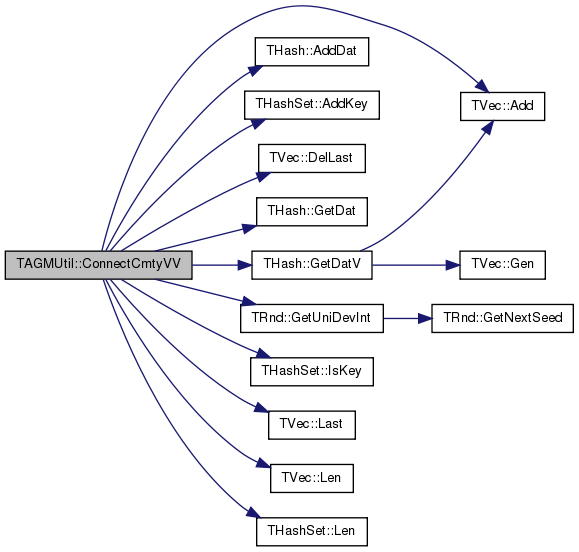

| void TAGMUtil::DumpCmtyVV | ( | const TStr & | OutFNm, |
| const TVec< TIntV > & | CmtyVV | ||
| ) | [static] |
dump bipartite community affiliation into a text file
Definition at line 266 of file agm.cpp.
References TStr::CStr(), and TVec< TVal, TSizeTy >::Len().
{
FILE* F = fopen(OutFNm.CStr(),"wt");
for (int i = 0; i < CmtyVV.Len(); i++) {
for (int j = 0; j < CmtyVV[i].Len(); j++) {
fprintf(F,"%d\t", (int) CmtyVV[i][j]);
}
fprintf(F,"\n");
}
fclose(F);
}

| void TAGMUtil::DumpCmtyVV | ( | const TStr | OutFNm, |
| TVec< TIntV > & | CmtyVV, | ||
| TIntStrH & | NIDNmH | ||
| ) | [static] |
dump bipartite community affiliation into a text file with node names
Definition at line 278 of file agm.cpp.
References TStr::CStr(), THash< TKey, TDat, THashFunc >::GetDat(), THash< TKey, TDat, THashFunc >::IsKey(), and TVec< TVal, TSizeTy >::Len().
{
FILE* F = fopen(OutFNm.CStr(), "wt");
for (int c = 0; c < CmtyVV.Len(); c++) {
for (int u = 0; u < CmtyVV[c].Len(); u++) {
if (NIDNmH.IsKey(CmtyVV[c][u])){
fprintf(F, "%s\t", NIDNmH.GetDat(CmtyVV[c][u]).CStr());
}
else {
fprintf(F, "%d\t", (int) CmtyVV[c][u]);
}
}
fprintf(F, "\n");
}
fclose(F);
}
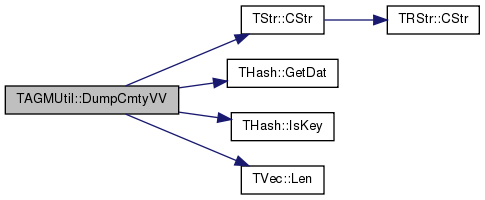
| int TAGMUtil::FindComsByAGM | ( | const PUNGraph & | Graph, |
| const int | InitComs, | ||
| const int | MaxIter, | ||
| const int | RndSeed, | ||
| const double | RegGap, | ||
| const double | PNoCom = 0.0, |
||
| const TStr | PltFPrx = TStr() |
||
| ) | [static] |
estimate number of communities using AGM
Definition at line 524 of file agm.cpp.
References TVec< TVal, TSizeTy >::Add(), TLogRegFit::CalcLogRegNewton(), TStr::Fmt(), TAGMFit::GetCmtyVV(), TUNGraph::GetEdges(), TUNGraph::GetNodes(), TVec< TFlt >::GetV(), gpsLog10X, gpwLinesPoints, IAssert, TVec< TVal, TSizeTy >::Last(), TStr::Len(), TVec< TVal, TSizeTy >::Len(), TAGMFit::Likelihood(), TAGMFit::MLEGradAscentGivenCAG(), TFlt::Mn, TFlt::Mx, TMath::Round(), TAGMFit::RunMCMC(), TAGMFit::SetPNoCom(), TAGMFit::SetRegCoef(), and TPair< TVal1, TVal2 >::Val2.
{
TRnd Rnd(RndSeed);
int LambdaIter = 100;
if (Graph->GetNodes() < 200) { LambdaIter = 1; }
if (Graph->GetNodes() < 200 && Graph->GetEdges() > 2000) { LambdaIter = 100; }
//Find coms with large C
TAGMFit AGMFitM(Graph, InitComs, RndSeed);
if (PNoCom > 0.0) { AGMFitM.SetPNoCom(PNoCom); }
AGMFitM.RunMCMC(MaxIter, LambdaIter, "");
int TE = Graph->GetEdges();
TFltV RegV;
RegV.Add(0.3 * TE);
for (int r = 0; r < 25; r++) {
RegV.Add(RegV.Last() * RegGap);
}
TFltPrV RegComsV, RegLV, RegBICV;
TFltV LV, BICV;
//record likelihood and number of communities with nonzero P_c
for (int r = 0; r < RegV.Len(); r++) {
double RegCoef = RegV[r];
AGMFitM.SetRegCoef(RegCoef);
AGMFitM.MLEGradAscentGivenCAG(0.01, 1000);
AGMFitM.SetRegCoef(0.0);
TVec<TIntV> EstCmtyVV;
AGMFitM.GetCmtyVV(EstCmtyVV, 0.99);
int NumLowQ = EstCmtyVV.Len();
RegComsV.Add(TFltPr(RegCoef, (double) NumLowQ));
if (EstCmtyVV.Len() > 0) {
TAGMFit AFTemp(Graph, EstCmtyVV, Rnd);
AFTemp.MLEGradAscentGivenCAG(0.001, 1000);
double CurL = AFTemp.Likelihood();
LV.Add(CurL);
BICV.Add(-2.0 * CurL + (double) EstCmtyVV.Len() * log((double) Graph->GetNodes() * (Graph->GetNodes() - 1) / 2.0));
}
else {
break;
}
}
// if likelihood does not exist or does not change at all, report the smallest number of communities or 2
if (LV.Len() == 0) { return 2; }
else if (LV[0] == LV.Last()) { return (int) TMath::Mx<TFlt>(2.0, RegComsV[LV.Len() - 1].Val2); }
//normalize likelihood and BIC to 0~100
int MaxL = 100;
{
TFltV& ValueV = LV;
TFltPrV& RegValueV = RegLV;
double MinValue = TFlt::Mx, MaxValue = TFlt::Mn;
for (int l = 0; l < ValueV.Len(); l++) {
if (ValueV[l] < MinValue) { MinValue = ValueV[l]; }
if (ValueV[l] > MaxValue) { MaxValue = ValueV[l]; }
}
while (ValueV.Len() < RegV.Len()) { ValueV.Add(MinValue); }
double RangeVal = MaxValue - MinValue;
for (int l = 0; l < ValueV.Len(); l++) {
RegValueV.Add(TFltPr(RegV[l], double(MaxL) * (ValueV[l] - MinValue) / RangeVal));
}
}
{
TFltV& ValueV = BICV;
TFltPrV& RegValueV = RegBICV;
double MinValue = TFlt::Mx, MaxValue = TFlt::Mn;
for (int l = 0; l < ValueV.Len(); l++) {
if (ValueV[l] < MinValue) { MinValue = ValueV[l]; }
if (ValueV[l] > MaxValue) { MaxValue = ValueV[l]; }
}
while (ValueV.Len() < RegV.Len()) { ValueV.Add(MaxValue); }
double RangeVal = MaxValue - MinValue;
for (int l = 0; l < ValueV.Len(); l++) {
RegValueV.Add(TFltPr(RegV[l], double(MaxL) * (ValueV[l] - MinValue) / RangeVal));
}
}
//fit logistic regression to normalized likelihood.
TVec<TFltV> XV(RegLV.Len());
TFltV YV (RegLV.Len());
for (int l = 0; l < RegLV.Len(); l++) {
XV[l] = TFltV::GetV(log(RegLV[l].Val1));
YV[l] = RegLV[l].Val2 / (double) MaxL;
}
TFltPrV LRVScaled, LRV;
TLogRegFit LRFit;
PLogRegPredict LRMd = LRFit.CalcLogRegNewton(XV, YV, PltFPrx);
for (int l = 0; l < RegLV.Len(); l++) {
LRV.Add(TFltPr(RegV[l], LRMd->GetCfy(XV[l])));
LRVScaled.Add(TFltPr(RegV[l], double(MaxL) * LRV.Last().Val2));
}
//estimate # communities from fitted logistic regression
int NumComs = 0, IdxRegDrop = 0;
double LRThres = 1.1, RegDrop; // 1 / (1 + exp(1.1)) = 0.25
double LeftReg = 0.0, RightReg = 0.0;
TFltV Theta;
LRMd->GetTheta(Theta);
RegDrop = (- Theta[1] - LRThres) / Theta[0];
if (RegDrop <= XV[0][0]) { NumComs = (int) RegComsV[0].Val2; }
else if (RegDrop >= XV.Last()[0]) { NumComs = (int) RegComsV.Last().Val2; }
else { //interpolate for RegDrop
for (int i = 0; i < XV.Len(); i++) {
if (XV[i][0] > RegDrop) { IdxRegDrop = i; break; }
}
if (IdxRegDrop == 0) {
printf("Error!! RegDrop:%f, Theta[0]:%f, Theta[1]:%f\n", RegDrop, Theta[0].Val, Theta[1].Val);
for (int l = 0; l < RegLV.Len(); l++) {
printf("X[%d]:%f, Y[%d]:%f\n", l, XV[l][0].Val, l, YV[l].Val);
}
}
IAssert(IdxRegDrop > 0);
LeftReg = RegDrop - XV[IdxRegDrop - 1][0];
RightReg = XV[IdxRegDrop][0] - RegDrop;
NumComs = (int) TMath::Round( (RightReg * RegComsV[IdxRegDrop - 1].Val2 + LeftReg * RegComsV[IdxRegDrop].Val2) / (LeftReg + RightReg));
}
//printf("Interpolation coeff: %f, %f, index at drop:%d (%f), Left-Right Vals: %f, %f\n", LeftReg, RightReg, IdxRegDrop, RegDrop, RegComsV[IdxRegDrop - 1].Val2, RegComsV[IdxRegDrop].Val2);
printf("Num Coms:%d\n", NumComs);
if (NumComs < 2) { NumComs = 2; }
if (PltFPrx.Len() > 0) {
TStr PlotTitle = TStr::Fmt("N:%d, E:%d ", Graph->GetNodes(), TE);
TGnuPlot GPC(PltFPrx + ".l");
GPC.AddPlot(RegComsV, gpwLinesPoints, "C");
GPC.AddPlot(RegLV, gpwLinesPoints, "likelihood");
GPC.AddPlot(RegBICV, gpwLinesPoints, "BIC");
GPC.AddPlot(LRVScaled, gpwLinesPoints, "Sigmoid (scaled)");
GPC.SetScale(gpsLog10X);
GPC.SetTitle(PlotTitle);
GPC.SavePng(PltFPrx + ".l.png");
}
return NumComs;
}
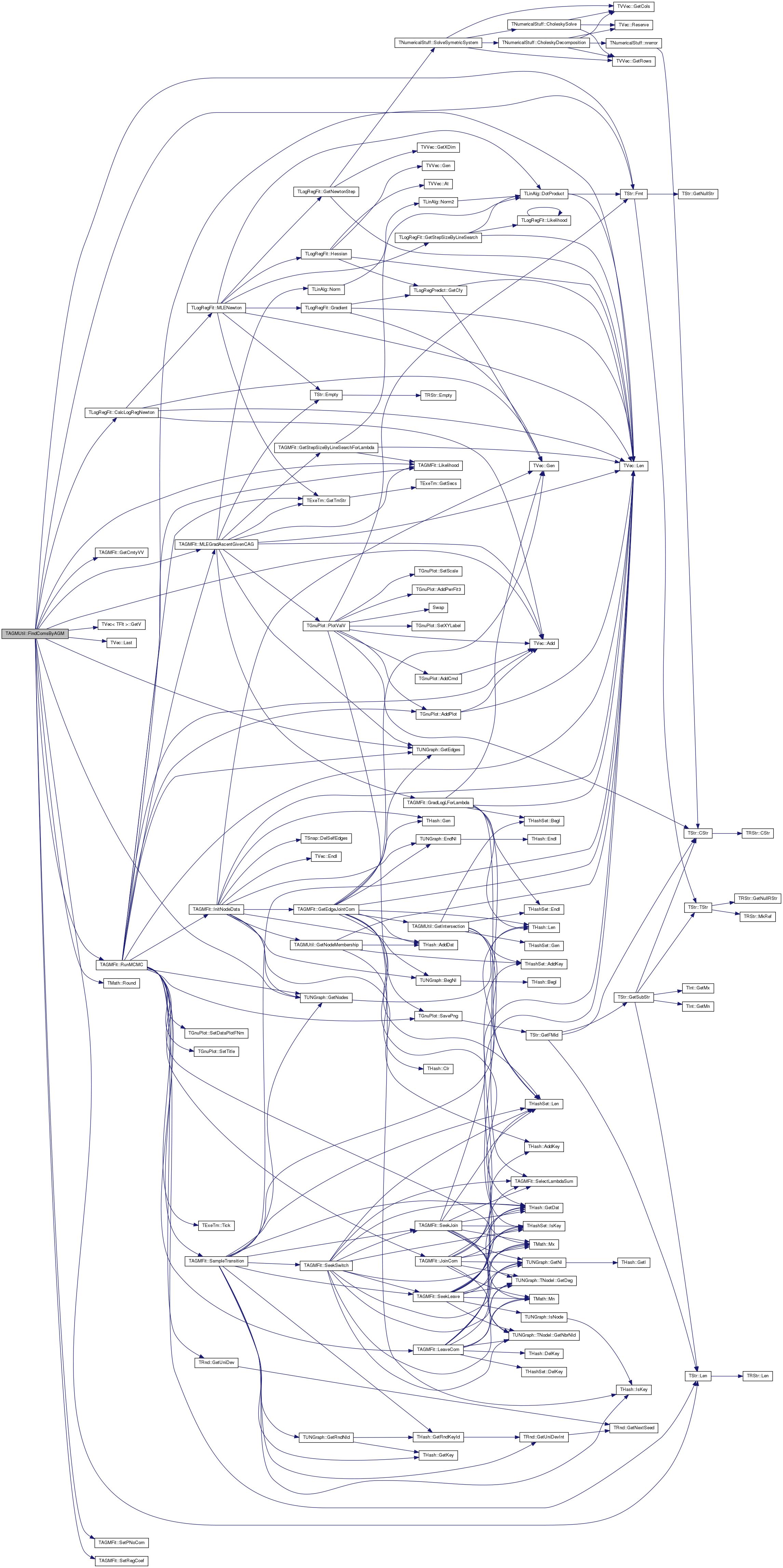
| static PUNGraph TAGMUtil::GenAGM | ( | TVec< TIntV > & | CmtyVV, |
| const double & | DensityCoef, | ||
| const double & | ScaleCoef, | ||
| TRnd & | Rnd = TInt::Rnd |
||
| ) | [static] |
| static PUNGraph TAGMUtil::GenAGM | ( | TVec< TIntV > & | CmtyVV, |
| const double & | DensityCoef, | ||
| const int | TargetEdges, | ||
| TRnd & | Rnd | ||
| ) | [static] |
| static PUNGraph TAGMUtil::GenAGM | ( | TVec< TIntV > & | CmtyVV, |
| const TFltV & | CProbV, | ||
| TRnd & | Rnd, | ||
| const double | PNoCom = -1.0 |
||
| ) | [static] |
| void TAGMUtil::GenCmtyVVFromPL | ( | TVec< TIntV > & | CmtyVV, |
| const PUNGraph & | Graph, | ||
| const int & | Nodes, | ||
| const int & | Coms, | ||
| const double & | ComSzAlpha, | ||
| const double & | MemAlpha, | ||
| const int & | MinSz, | ||
| const int & | MaxSz, | ||
| const int & | MinK, | ||
| const int & | MaxK, | ||
| TRnd & | Rnd | ||
| ) | [static] |
Generate bipartite community affiliation from given power law coefficients for membership distribution and community size distribution.
Definition at line 101 of file agm.cpp.
References TVec< TVal, TSizeTy >::Clr(), and TUNGraph::GetNIdV().
Referenced by GenCmtyVVFromPL(), and TAGMFit::RandomInitCmtyVV().
{
if (Coms == 0 || Nodes == 0) {
CmtyVV.Clr();
return;
}
TIntV NIDV;
Graph->GetNIdV(NIDV);
GenCmtyVVFromPL(CmtyVV, NIDV, Nodes, Coms, ComSzAlpha, MemAlpha, MinSz, MaxSz, MinK, MaxK, Rnd);
}
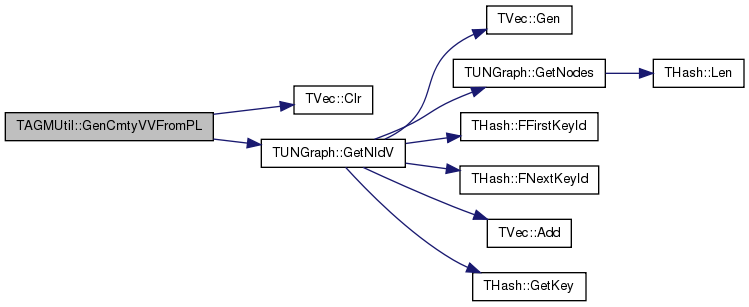

| void TAGMUtil::GenCmtyVVFromPL | ( | TVec< TIntV > & | CmtyVV, |
| const TIntV & | NIDV, | ||
| const int & | Nodes, | ||
| const int & | Coms, | ||
| const double & | ComSzAlpha, | ||
| const double & | MemAlpha, | ||
| const int & | MinSz, | ||
| const int & | MaxSz, | ||
| const int & | MinK, | ||
| const int & | MaxK, | ||
| TRnd & | Rnd | ||
| ) | [static] |
Generate bipartite community affiliation from given power law coefficients for membership distribution and community size distribution.
Definition at line 112 of file agm.cpp.
References TVec< TVal, TSizeTy >::Add(), TVec< TVal, TSizeTy >::Clr(), ConnectCmtyVV(), GenPLSeq(), and TVec< TVal, TSizeTy >::Len().
{
if (Coms == 0 || Nodes == 0) {
CmtyVV.Clr();
return;
}
TIntV ComSzSeq, MemSeq;
TAGMUtil::GenPLSeq(ComSzSeq,Coms,ComSzAlpha,Rnd,MinSz,MaxSz);
TAGMUtil::GenPLSeq(MemSeq,Nodes,MemAlpha,Rnd,MinK,MaxK);
TIntPrV CIDSzPrV, NIDMemPrV;
for (int i = 0; i < ComSzSeq.Len(); i++) {
CIDSzPrV.Add(TIntPr(i, ComSzSeq[i]));
}
for (int i = 0; i < MemSeq.Len(); i++) {
NIDMemPrV.Add(TIntPr(NIDV[i], MemSeq[i]));
}
TAGMUtil::ConnectCmtyVV(CmtyVV, CIDSzPrV, NIDMemPrV, Rnd);
}
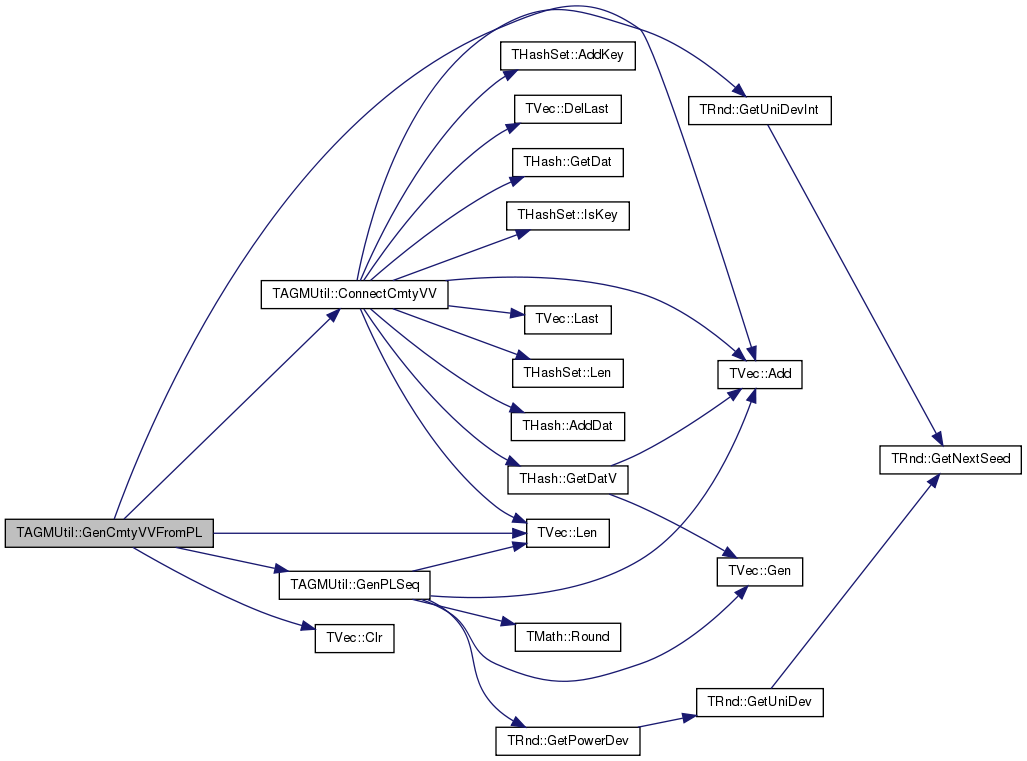
| void TAGMUtil::GenCmtyVVFromPL | ( | TVec< TIntV > & | CmtyVV, |
| const int & | Nodes, | ||
| const int & | Coms, | ||
| const double & | ComSzAlpha, | ||
| const double & | MemAlpha, | ||
| const int & | MinSz, | ||
| const int & | MaxSz, | ||
| const int & | MinK, | ||
| const int & | MaxK, | ||
| TRnd & | Rnd | ||
| ) | [static] |
Generate bipartite community affiliation from given power law coefficients for membership distribution and community size distribution.
Definition at line 92 of file agm.cpp.
References TVec< TVal, TSizeTy >::Add(), and GenCmtyVVFromPL().
{
TIntV NIDV(Nodes, 0);
for (int i = 0; i < Nodes; i++) {
NIDV.Add(i);
}
GenCmtyVVFromPL(CmtyVV, NIDV, Nodes, Coms, ComSzAlpha, MemAlpha, MinSz, MaxSz, MinK, MaxK, Rnd);
}

| void TAGMUtil::GenPLSeq | ( | TIntV & | SzSeq, |
| const int & | SeqLen, | ||
| const double & | Alpha, | ||
| TRnd & | Rnd, | ||
| const int & | Min, | ||
| const int & | Max | ||
| ) | [static] |
Generate sequence from Power law.
AGMUtil:: Utilities for AGM
Definition at line 81 of file agm.cpp.
References TVec< TVal, TSizeTy >::Add(), TVec< TVal, TSizeTy >::Gen(), TRnd::GetPowerDev(), TVec< TVal, TSizeTy >::Len(), and TMath::Round().
Referenced by GenCmtyVVFromPL().
{
SzSeq.Gen(SeqLen, 0);
while (SzSeq.Len() < SeqLen) {
int Sz = (int) TMath::Round(Rnd.GetPowerDev(Alpha));
if (Sz >= Min && Sz <= Max) {
SzSeq.Add(Sz);
}
}
}
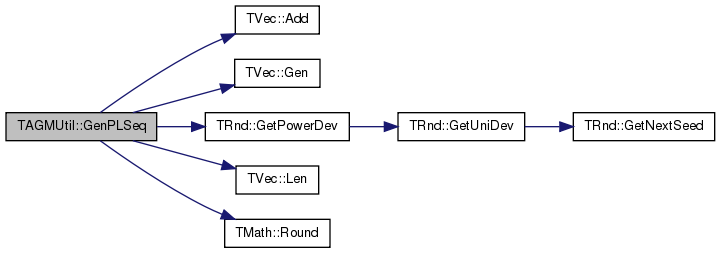

| double TAGMUtil::GetConductance | ( | const PUNGraph & | Graph, |
| const TIntSet & | CmtyS, | ||
| const int | Edges | ||
| ) | [static] |
Definition at line 663 of file agm.cpp.
References TUNGraph::GetEdges(), TUNGraph::GetNI(), TUNGraph::TNodeI::GetOutDeg(), TUNGraph::TNodeI::GetOutNId(), THashSet< TKey, THashFunc >::IsKey(), TUNGraph::IsNode(), and THashSet< TKey, THashFunc >::Len().
Referenced by TAGMFast::NeighborComInit(), and TAGMFit::NeighborComInit().
{
const int Edges2 = Edges >= 0 ? 2*Edges : Graph->GetEdges();
int Vol = 0, Cut = 0;
double Phi = 0.0;
for (int i = 0; i < CmtyS.Len(); i++) {
if (! Graph->IsNode(CmtyS[i])) { continue; }
TUNGraph::TNodeI NI = Graph->GetNI(CmtyS[i]);
for (int e = 0; e < NI.GetOutDeg(); e++) {
if (! CmtyS.IsKey(NI.GetOutNId(e))) { Cut += 1; }
}
Vol += NI.GetOutDeg();
}
// get conductance
if (Vol != Edges2) {
if (2 * Vol > Edges2) { Phi = Cut / double (Edges2 - Vol); }
else if (Vol == 0) { Phi = 0.0; }
else { Phi = Cut / double(Vol); }
} else {
if (Vol == Edges2) { Phi = 1.0; }
}
return Phi;
}
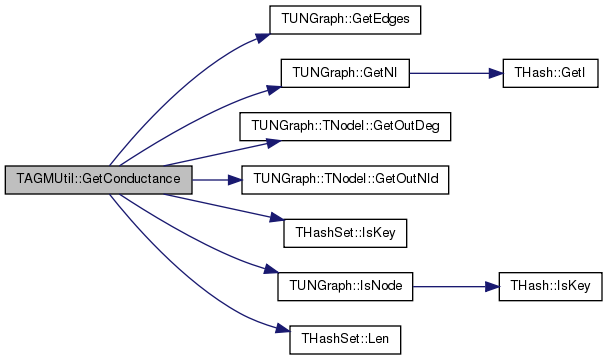

| void TAGMUtil::GetIntersection | ( | const THashSet< TInt > & | A, |
| const THashSet< TInt > & | B, | ||
| THashSet< TInt > & | C | ||
| ) | [static] |
Definition at line 384 of file agm.cpp.
References THashSet< TKey, THashFunc >::AddKey(), THashSet< TKey, THashFunc >::BegI(), THashSet< TKey, THashFunc >::EndI(), THashSet< TKey, THashFunc >::Gen(), THashSet< TKey, THashFunc >::IsKey(), and THashSet< TKey, THashFunc >::Len().
Referenced by TAGMFit::CalcPNoComByCmtyVV(), and TAGMFit::GetEdgeJointCom().
{
C.Gen(A.Len());
if (A.Len() < B.Len()) {
for (THashSetKeyI<TInt> it = A.BegI(); it < A.EndI(); it++)
if (B.IsKey(it.GetKey())) C.AddKey(it.GetKey());
} else {
for (THashSetKeyI<TInt> it = B.BegI(); it < B.EndI(); it++)
if (A.IsKey(it.GetKey())) C.AddKey(it.GetKey());
}
}
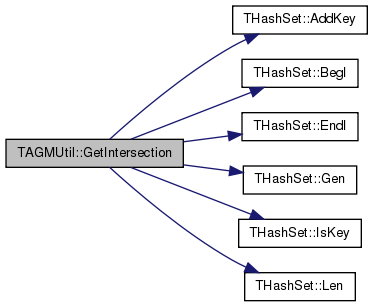

| void TAGMUtil::GetNbhCom | ( | const PUNGraph & | Graph, |
| const int | NID, | ||
| TIntSet & | NBCmtyS | ||
| ) | [static] |
Definition at line 686 of file agm.cpp.
References THashSet< TKey, THashFunc >::AddKey(), THashSet< TKey, THashFunc >::Gen(), TUNGraph::TNodeI::GetDeg(), TUNGraph::TNodeI::GetNbrNId(), and TUNGraph::GetNI().
Referenced by TAGMFast::NeighborComInit(), and TAGMFit::NeighborComInit().
{
TUNGraph::TNodeI NI = Graph->GetNI(NID);
NBCmtyS.Gen(NI.GetDeg());
NBCmtyS.AddKey(NID);
for (int e = 0; e < NI.GetDeg(); e++) {
NBCmtyS.AddKey(NI.GetNbrNId(e));
}
}
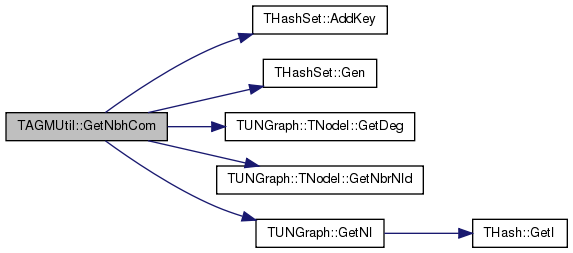

| void TAGMUtil::GetNodeMembership | ( | THash< TInt, TIntSet > & | NIDComVH, |
| const TVec< TIntV > & | CmtyVV | ||
| ) | [static] |
get hash table of <Node ID, community IDs which node belongs to>
Definition at line 315 of file agm.cpp.
References THash< TKey, TDat, THashFunc >::AddDat(), THashSet< TKey, THashFunc >::AddKey(), THash< TKey, TDat, THashFunc >::Clr(), and TVec< TVal, TSizeTy >::Len().
Referenced by GetNodeMembership(), GVizComGraph(), TAGMFit::InitNodeData(), SaveBipartiteGephi(), and SaveGephi().
{
NIDComVH.Clr();
for (int i = 0; i < CmtyVV.Len(); i++){
int CID = i;
for (int j = 0; j < CmtyVV[i].Len(); j++) {
int NID = CmtyVV[i][j];
NIDComVH.AddDat(NID).AddKey(CID);
}
}
}
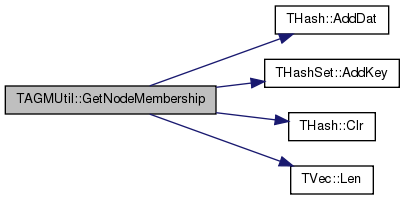

| void TAGMUtil::GetNodeMembership | ( | THash< TInt, TIntSet > & | NIDComVH, |
| const TVec< TIntV > & | CmtyVV, | ||
| const TIntV & | NIDV | ||
| ) | [static] |
get hash table of <Node ID, community IDs which node belongs to>. Some nodes in NIDV might belong to no community
Definition at line 327 of file agm.cpp.
References THash< TKey, TDat, THashFunc >::AddDat(), THashSet< TKey, THashFunc >::AddKey(), THash< TKey, TDat, THashFunc >::Clr(), and TVec< TVal, TSizeTy >::Len().
{
NIDComVH.Clr();
for (int u = 0; u < NIDV.Len(); u++) {
NIDComVH.AddDat(NIDV[u]);
}
for (int i = 0; i < CmtyVV.Len(); i++){
int CID = i;
for (int j = 0; j < CmtyVV[i].Len(); j++) {
int NID = CmtyVV[i][j];
NIDComVH.AddDat(NID).AddKey(CID);
}
}
}
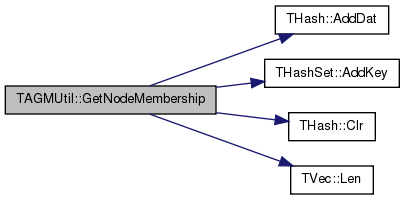
| void TAGMUtil::GetNodeMembership | ( | TIntH & | NIDComVH, |
| const THash< TInt, TIntV > & | CmtyVH | ||
| ) | [static] |
get hash table of <Node ID, membership size>
Definition at line 304 of file agm.cpp.
References THash< TKey, TDat, THashFunc >::AddDat(), THash< TKey, TDat, THashFunc >::BegI(), THash< TKey, TDat, THashFunc >::Clr(), and THash< TKey, TDat, THashFunc >::EndI().
{
NIDComVH.Clr();
for (THash<TInt,TIntV>::TIter HI = CmtyVH.BegI(); HI < CmtyVH.EndI(); HI++){
for (int j = 0;j < HI.GetDat().Len(); j++) {
int NID = HI.GetDat()[j];
NIDComVH.AddDat(NID)++;
}
}
}
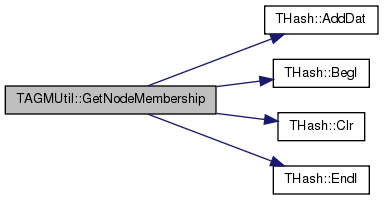
| void TAGMUtil::GetNodeMembership | ( | THash< TInt, TIntSet > & | NIDComVH, |
| const TVec< TIntSet > & | CmtyVV | ||
| ) | [static] |
Definition at line 342 of file agm.cpp.
References THash< TKey, TDat, THashFunc >::AddDat(), THashSet< TKey, THashFunc >::AddKey(), TVec< TVal, TSizeTy >::EndI(), and TVec< TVal, TSizeTy >::Len().
{
for (int i = 0; i < CmtyVV.Len(); i++){
int CID = i;
for (TIntSet::TIter SI = CmtyVV[i].BegI(); SI < CmtyVV[i].EndI(); SI++) {
int NID = SI.GetKey();
NIDComVH.AddDat(NID).AddKey(CID);
}
}
}
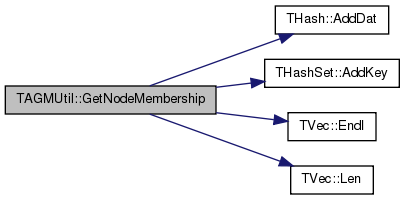
| void TAGMUtil::GetNodeMembership | ( | THash< TInt, TIntSet > & | NIDComVH, |
| const THash< TInt, TIntV > & | CmtyVH | ||
| ) | [static] |
Definition at line 351 of file agm.cpp.
References THash< TKey, TDat, THashFunc >::AddDat(), THashSet< TKey, THashFunc >::AddKey(), THash< TKey, TDat, THashFunc >::BegI(), and THash< TKey, TDat, THashFunc >::EndI().
{
for (THash<TInt,TIntV>::TIter HI = CmtyVH.BegI(); HI < CmtyVH.EndI(); HI++){
int CID = HI.GetKey();
for (int j = 0; j < HI.GetDat().Len(); j++) {
int NID = HI.GetDat()[j];
NIDComVH.AddDat(NID).AddKey(CID);
}
}
}
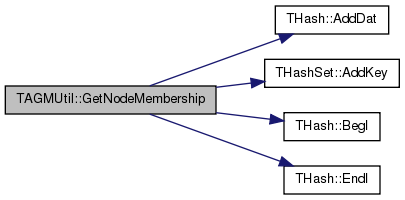
| void TAGMUtil::GetNodeMembership | ( | THash< TInt, TIntV > & | NIDComVH, |
| const THash< TInt, TIntV > & | CmtyVH | ||
| ) | [static] |
Definition at line 361 of file agm.cpp.
References TVec< TVal, TSizeTy >::Add(), THash< TKey, TDat, THashFunc >::AddDat(), THash< TKey, TDat, THashFunc >::GetKey(), and THash< TKey, TDat, THashFunc >::Len().
{
for (int i = 0; i < CmtyVH.Len(); i++){
int CID = CmtyVH.GetKey(i);
for (int j = 0; j < CmtyVH[i].Len(); j++) {
int NID = CmtyVH[i][j];
NIDComVH.AddDat(NID).Add(CID);
}
}
}
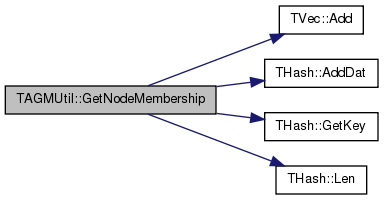
| void TAGMUtil::GetNodeMembership | ( | THash< TInt, TIntV > & | NIDComVH, |
| const TVec< TIntV > & | CmtyVV | ||
| ) | [static] |
Definition at line 371 of file agm.cpp.
References THash< TKey, TDat, THashFunc >::AddDat(), GetNodeMembership(), and TVec< TVal, TSizeTy >::Len().
{
THash<TInt,TIntV> CmtyVH;
for (int i = 0; i < CmtyVV.Len(); i++) {
CmtyVH.AddDat(i, CmtyVV[i]);
}
GetNodeMembership(NIDComVH, CmtyVH);
}

| static void TAGMUtil::GetNodeMembership | ( | TIntH & | NIDComVH, |
| const TVec< TIntV > & | CmtyVV | ||
| ) | [static] |
| static void TAGMUtil::GVizComGraph | ( | const PGraph & | Graph, |
| const TVec< TIntV > & | CmtyVV, | ||
| const TStr & | OutFNm, | ||
| const TStr & | Desc = TStr() |
||
| ) | [inline, static] |
Definition at line 80 of file agm.h.
References TStr::CStr(), TStr::Fmt(), THash< TKey, TDat, THashFunc >::GetDat(), TStr::GetFExt(), GetNodeMembership(), TStr::GetSubStr(), TVec< TVal, TSizeTy >::GetV(), gfDirected, TSnap::TSnapDetail::GVizDoLayout(), gvlNeato, HasGraphFlag, IAssert, TStr::Len(), and TVec< TVal, TSizeTy >::Len().
{
TStrV Colors = TStrV::GetV("red","blue","green","pink","cyan");
TStrV Shapes = TStrV::GetV("ellipse","triangle","square","pentagon","hexagon");
THash<TInt,TIntV> NIDComVH;
GetNodeMembership(NIDComVH,CmtyVV);
const TStr Ext = OutFNm.GetFExt();
const TStr GraphFNm = OutFNm.GetSubStr(0, OutFNm.Len() - Ext.Len()) + "dot";
const bool IsDir = HasGraphFlag(typename PGraph::TObj, gfDirected);
FILE *F = fopen(GraphFNm.CStr(), "wt");
if (! Desc.Empty()) fprintf(F, "/*****\n%s\n*****/\n\n", Desc.CStr());
if (IsDir) { fprintf(F, "digraph G {\n"); } else { fprintf(F, "graph G {\n"); }
fprintf(F, " graph [splines=false overlap=false]\n"); //size=\"12,10\" ratio=fill
fprintf(F, " node [width=0.3, height=0.3]\n");
//nodes
for (typename PGraph::TObj::TNodeI NI = Graph->BegNI(); NI < Graph->EndNI(); NI++) {
int NID = NI.GetId();
TIntV& CIDV = NIDComVH.GetDat(NID);
IAssert(CIDV.Len()>0);
TStr ShapeNm = Shapes[(CIDV.Len()-1) % Shapes.Len()];
TStr ColorNm = Colors[CIDV[0] % Colors.Len()];
TStr NodeComLabel = TStr::Fmt("%d(",NID);
for(int i=0;i<CIDV.Len();i++) {
TStr TmpStr = TStr::Fmt("%d",int(CIDV[i]));
NodeComLabel += TmpStr;
if(i<CIDV.Len()-1){NodeComLabel+=",";}
}
NodeComLabel += ")";
fprintf(F, " %d [style=filled, shape=\"%s\" fillcolor=\"%s\" label=\"%s\"];\n", NI.GetId(), ShapeNm.CStr(),ColorNm.CStr(), NodeComLabel.CStr());
}
// edges
for (typename PGraph::TObj::TNodeI NI = Graph->BegNI(); NI < Graph->EndNI(); NI++) {
if (NI.GetOutDeg()==0 && NI.GetInDeg()==0 ) {
fprintf(F, "%d;\n", NI.GetId()); }
else {
for (int e = 0; e < NI.GetOutDeg(); e++) {
if (! IsDir && NI.GetId() > NI.GetOutNId(e)) { continue; }
fprintf(F, " %d %s %d;\n", NI.GetId(), IsDir?"->":"--", NI.GetOutNId(e));
}
}
}
if (! Desc.Empty()) {
fprintf(F, " label = \"\\n%s\\n\";", Desc.CStr());
fprintf(F, " fontsize=24;\n");
}
fprintf(F, "}\n");
fclose(F);
TSnap::TSnapDetail::GVizDoLayout(GraphFNm, OutFNm, gvlNeato);
}
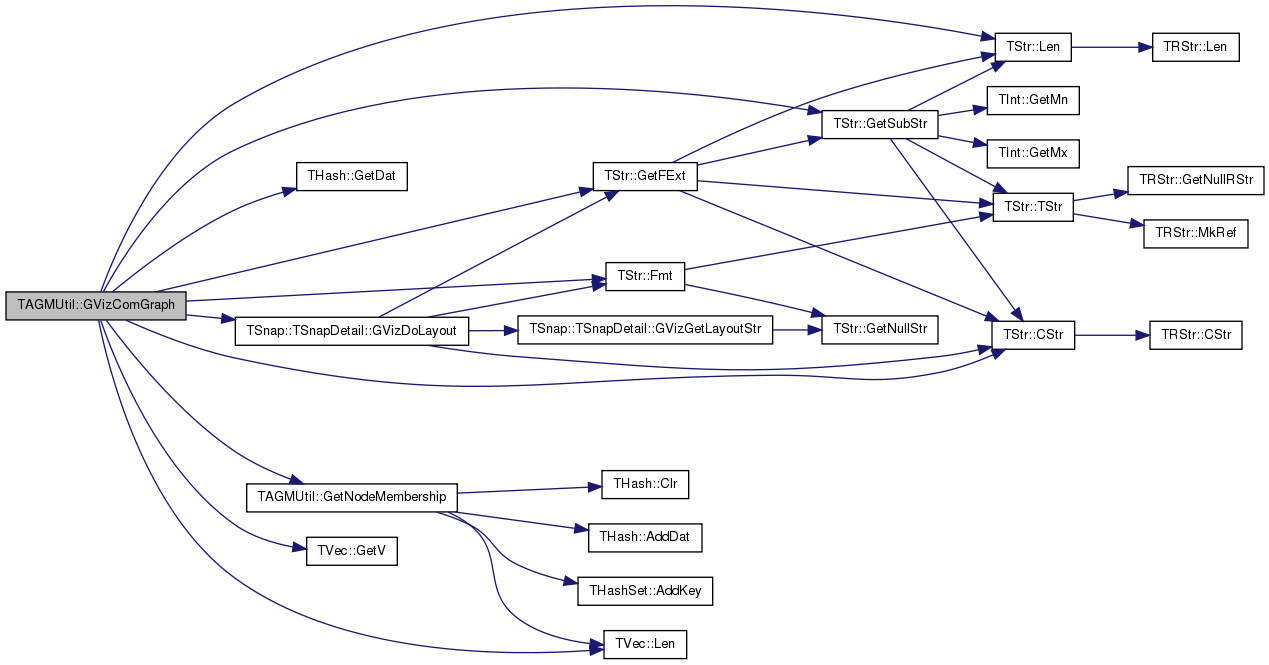
| int TAGMUtil::Intersection | ( | const TIntV & | C1, |
| const TIntV & | C2 | ||
| ) | [static] |
Definition at line 379 of file agm.cpp.
{
TIntSet S1(C1), S2(C2);
return TAGMUtil::Intersection(S1, S2);
}
| int TAGMUtil::Intersection | ( | const THashSet< TInt > & | A, |
| const THashSet< TInt > & | B | ||
| ) | [static] |
Definition at line 395 of file agm.cpp.
References THashSet< TKey, THashFunc >::BegI(), THashSet< TKey, THashFunc >::EndI(), THashSet< TKey, THashFunc >::IsKey(), and THashSet< TKey, THashFunc >::Len().
{
int n = 0;
if (A.Len() < B.Len()) {
for (THashSetKeyI<TInt> it = A.BegI(); it < A.EndI(); it++)
if (B.IsKey(it.GetKey())) n++;
} else {
for (THashSetKeyI<TInt> it = B.BegI(); it < B.EndI(); it++)
if (A.IsKey(it.GetKey())) n++;
}
return n;
}
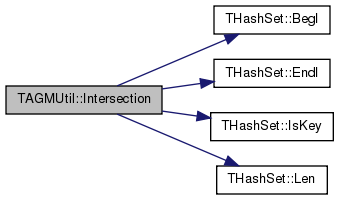
| void TAGMUtil::LoadCmtyVV | ( | const TStr & | InFNm, |
| TVec< TIntV > & | CmtyVV | ||
| ) | [static] |
load bipartite community affiliation graph from text file (each row contains the member node IDs for each community)
Definition at line 246 of file agm.cpp.
References TVec< TVal, TSizeTy >::Add(), TVec< TVal, TSizeTy >::Gen(), TSsParser::GetFlds(), TSsParser::GetInt(), TSsParser::IsInt(), Kilo, TVec< TVal, TSizeTy >::Len(), TSsParser::Next(), TVec< TVal, TSizeTy >::Pack(), and ssfWhiteSep.
{
CmtyVV.Gen(Kilo(100), 0);
TSsParser Ss(InFNm, ssfWhiteSep);
while (Ss.Next()) {
if(Ss.GetFlds() > 0) {
TIntV CmtyV;
for (int i = 0; i < Ss.GetFlds(); i++) {
if (Ss.IsInt(i)) {
CmtyV.Add(Ss.GetInt(i));
}
}
CmtyVV.Add(CmtyV);
}
}
CmtyVV.Pack();
printf("community loading completed (%d communities)\n",CmtyVV.Len());
}
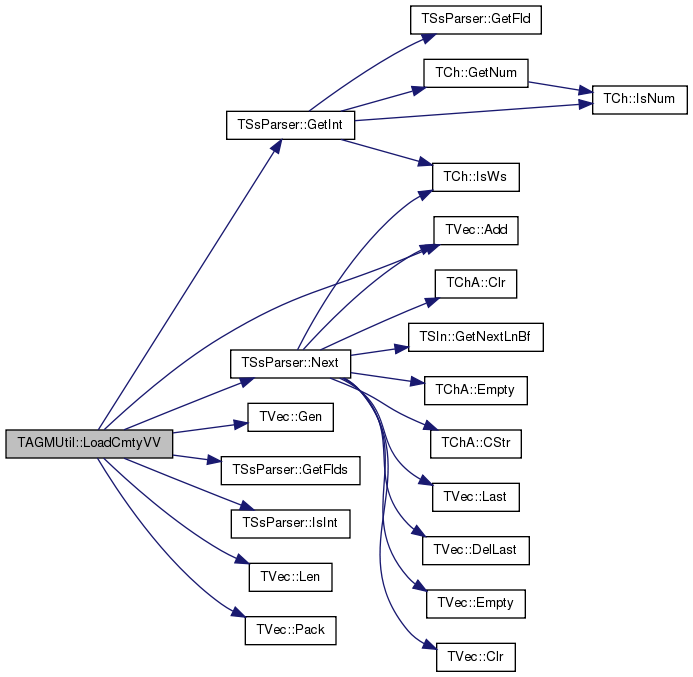
| static PGraph TAGMUtil::LoadEdgeListStr | ( | const TStr & | InFNm, |
| TIntStrH & | NIDNameH, | ||
| const int & | SrcColId = 0, |
||
| const int & | DstColId = 1, |
||
| const TSsFmt | SsFmt = ssfTabSep |
||
| ) | [inline, static] |
Definition at line 60 of file agm.h.
References THash< TKey, TDat, THashFunc >::AddDat(), TStrHash< TDat, TStringPool, THashFunc >::AddKey(), THash< TKey, TDat, THashFunc >::Gen(), TStrHash< TDat, TStringPool, THashFunc >::GetKey(), IAssert, THash< TKey, TDat, THashFunc >::Len(), TStrHash< TDat, TStringPool, THashFunc >::Len(), Mega, and TSsParser::Next().
{
TSsParser Ss(InFNm, SsFmt);
PGraph Graph = PGraph::TObj::New();
TStrHash<TInt> StrSet(Mega(1), true);
while (Ss.Next()) {
const int SrcNId = StrSet.AddKey(Ss[SrcColId]);
const int DstNId = StrSet.AddKey(Ss[DstColId]);
if (! Graph->IsNode(SrcNId)) { Graph->AddNode(SrcNId); }
if (! Graph->IsNode(DstNId)) { Graph->AddNode(DstNId); }
Graph->AddEdge(SrcNId, DstNId);
}
NIDNameH.Gen(StrSet.Len());
for (int s = 0; s < StrSet.Len(); s++) { NIDNameH.AddDat(s, StrSet.GetKey(s)); }
IAssert(NIDNameH.Len() == Graph->GetNodes());
Graph->Defrag();
return Graph;
}
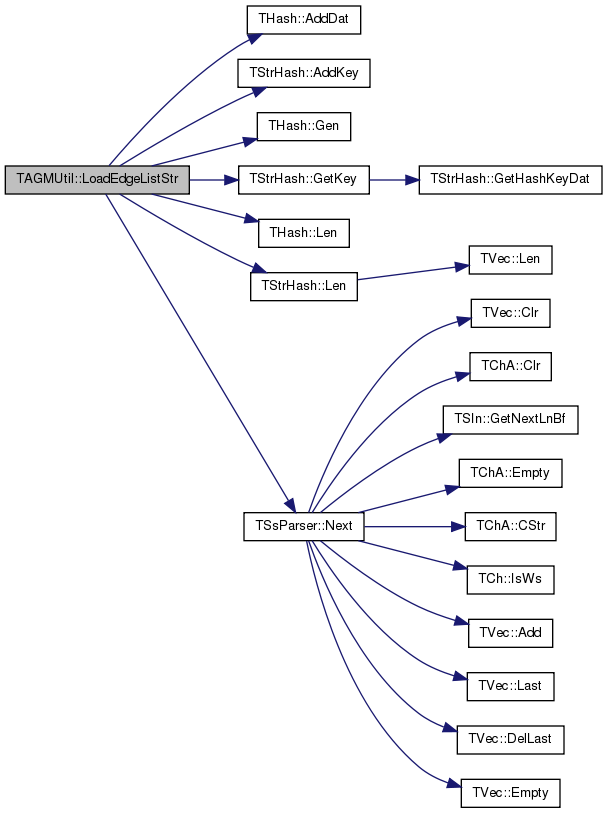
| void TAGMUtil::RewireCmtyNID | ( | THash< TInt, TIntV > & | CmtyVH, |
| TRnd & | Rnd | ||
| ) | [static] |
rewire bipartite community affiliation graphs
Definition at line 202 of file agm.cpp.
References TVec< TVal, TSizeTy >::Add(), TVec< TVal, TSizeTy >::DelLast(), THash< TKey, TDat, THashFunc >::GetKey(), TRnd::GetUniDevInt(), IAssert, THash< TKey, TDat, THashFunc >::IsKey(), TVec< TVal, TSizeTy >::Last(), THash< TKey, TDat, THashFunc >::Len(), TVec< TVal, TSizeTy >::Len(), TPair< TVal1, TVal2 >::Val1, and TPair< TVal1, TVal2 >::Val2.
Referenced by RewireCmtyVV().
{
THash<TInt,TIntV > NewCmtyVH(CmtyVH.Len());
TIntV NDegV;
TIntV CDegV;
for (int i = 0; i < CmtyVH.Len(); i++) {
int CID = CmtyVH.GetKey(i);
for (int j = 0; j < CmtyVH[i].Len(); j++) {
int NID = CmtyVH[i][j];
NDegV.Add(NID);
CDegV.Add(CID);
}
}
TIntPrSet CNIDSet(CDegV.Len());
int c=0;
while (c++ < 15 && CDegV.Len() > 1){
for (int i = 0; i < CDegV.Len(); i++) {
int u = Rnd.GetUniDevInt(CDegV.Len());
int v = Rnd.GetUniDevInt(NDegV.Len());
if (CNIDSet.IsKey(TIntPr(CDegV[u], NDegV[v]))) { continue; }
CNIDSet.AddKey(TIntPr(CDegV[u], NDegV[v]));
if (u == CDegV.Len() - 1) {
CDegV.DelLast();
} else {
CDegV[u] = CDegV.Last();
CDegV.DelLast();
}
if ( v == NDegV.Len() - 1) {
NDegV.DelLast();
} else{
NDegV[v] = NDegV.Last();
NDegV.DelLast();
}
}
}
for (int i = 0; i < CNIDSet.Len(); i++) {
TIntPr CNIDPr = CNIDSet[i];
IAssert(CmtyVH.IsKey(CNIDPr.Val1));
NewCmtyVH.AddDat(CNIDPr.Val1);
NewCmtyVH.GetDat(CNIDPr.Val1).Add(CNIDPr.Val2);
}
CmtyVH = NewCmtyVH;
}
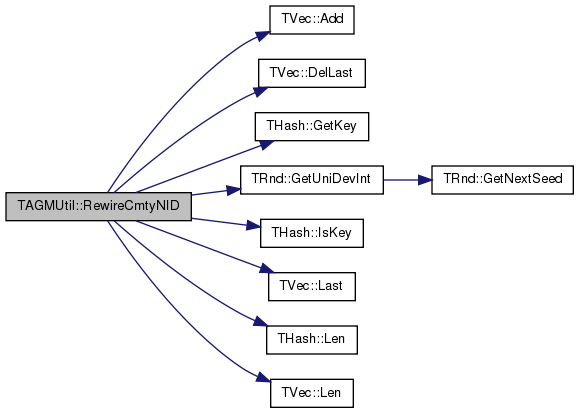

| void TAGMUtil::RewireCmtyVV | ( | const TVec< TIntV > & | CmtyVVIn, |
| TVec< TIntV > & | CmtyVVOut, | ||
| TRnd & | Rnd | ||
| ) | [static] |
rewire bipartite community affiliation graphs
Definition at line 192 of file agm.cpp.
References THash< TKey, TDat, THashFunc >::AddDat(), THash< TKey, TDat, THashFunc >::GetDatV(), TVec< TVal, TSizeTy >::Len(), and RewireCmtyNID().
{
THash<TInt,TIntV> CmtyVH;
for (int i = 0; i < CmtyVVIn.Len(); i++) {
CmtyVH.AddDat(i, CmtyVVIn[i]);
}
TAGMUtil::RewireCmtyNID(CmtyVH, Rnd);
CmtyVH.GetDatV(CmtyVVOut);
}
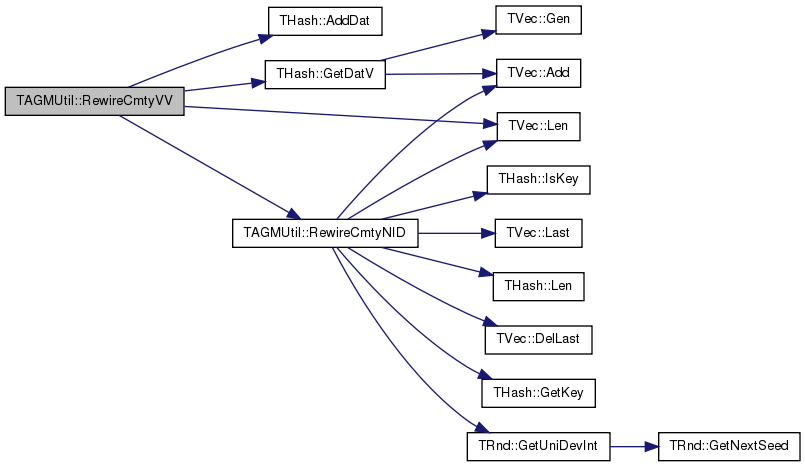
| static void TAGMUtil::RndConnectInsideCommunity | ( | PUNGraph & | Graph, |
| const TIntV & | CmtyV, | ||
| const double & | Prob, | ||
| TRnd & | Rnd | ||
| ) | [static] |
| void TAGMUtil::SaveBipartiteGephi | ( | const TStr & | OutFNm, |
| const TIntV & | NIDV, | ||
| const TVec< TIntV > & | CmtyVV, | ||
| const double | MaxSz, | ||
| const double | MinSz, | ||
| const TIntStrH & | NIDNameH, | ||
| const THash< TInt, TIntTr > & | NIDColorH, | ||
| const THash< TInt, TIntTr > & | CIDColorH | ||
| ) | [static] |
save bipartite community affiliation into gexf file
Plot bipartite graph
Definition at line 466 of file agm.cpp.
References TStr::CStr(), THash< TKey, TDat, THashFunc >::GetDat(), GetNodeMembership(), THash< TKey, TDat, THashFunc >::IsKey(), TVec< TVal, TSizeTy >::Len(), TTriple< TVal1, TVal2, TVal3 >::Val1, TTriple< TVal1, TVal2, TVal3 >::Val2, and TTriple< TVal1, TVal2, TVal3 >::Val3.
{
if (CmtyVV.Len() == 0) { return; }
double NXMin = 0.1, YMin = 0.1, NXMax = 250.00, YMax = 30.0;
double CXMin = 0.3 * NXMax, CXMax = 0.7 * NXMax;
double CStep = (CXMax - CXMin) / (double) CmtyVV.Len(), NStep = (NXMax - NXMin) / (double) NIDV.Len();
THash<TInt,TIntV> NIDComVH;
TAGMUtil::GetNodeMembership(NIDComVH, CmtyVV);
FILE* F = fopen(OutFNm.CStr(), "wt");
fprintf(F, "<?xml version='1.0' encoding='UTF-8'?>\n");
fprintf(F, "<gexf xmlns='http://www.gexf.net/1.2draft' xmlns:viz='http://www.gexf.net/1.1draft/viz' xmlns:xsi='http://www.w3.org/2001/XMLSchema-instance' xsi:schemaLocation='http://www.gexf.net/1.2draft http://www.gexf.net/1.2draft/gexf.xsd' version='1.2'>\n");
fprintf(F, "\t<graph mode='static' defaultedgetype='directed'>\n");
fprintf(F, "\t\t<nodes>\n");
for (int c = 0; c < CmtyVV.Len(); c++) {
int CID = c;
double XPos = c * CStep + CXMin;
TIntTr Color = CIDColorH.IsKey(CID)? CIDColorH.GetDat(CID) : TIntTr(120, 120, 120);
fprintf(F, "\t\t\t<node id='C%d' label='C%d'>\n", CID, CID);
fprintf(F, "\t\t\t\t<viz:color r='%d' g='%d' b='%d'/>\n", Color.Val1.Val, Color.Val2.Val, Color.Val3.Val);
fprintf(F, "\t\t\t\t<viz:size value='%.3f'/>\n", MaxSz);
fprintf(F, "\t\t\t\t<viz:shape value='square'/>\n");
fprintf(F, "\t\t\t\t<viz:position x='%f' y='%f' z='0.0'/>\n", XPos, YMax);
fprintf(F, "\t\t\t</node>\n");
}
for (int u = 0;u < NIDV.Len(); u++) {
int NID = NIDV[u];
TStr Label = NIDNameH.IsKey(NID)? NIDNameH.GetDat(NID): "";
double Size = MinSz;
double XPos = NXMin + u * NStep;
TIntTr Color = NIDColorH.IsKey(NID)? NIDColorH.GetDat(NID) : TIntTr(120, 120, 120);
double Alpha = 1.0;
fprintf(F, "\t\t\t<node id='%d' label='%s'>\n", NID, Label.CStr());
fprintf(F, "\t\t\t\t<viz:color r='%d' g='%d' b='%d' a='%.1f'/>\n", Color.Val1.Val, Color.Val2.Val, Color.Val3.Val, Alpha);
fprintf(F, "\t\t\t\t<viz:size value='%.3f'/>\n", Size);
fprintf(F, "\t\t\t\t<viz:shape value='square'/>\n");
fprintf(F, "\t\t\t\t<viz:position x='%f' y='%f' z='0.0'/>\n", XPos, YMin);
fprintf(F, "\t\t\t</node>\n");
}
fprintf(F, "\t\t</nodes>\n");
fprintf(F, "\t\t<edges>\n");
int EID = 0;
for (int u = 0;u < NIDV.Len(); u++) {
int NID = NIDV[u];
if (NIDComVH.IsKey(NID)) {
for (int c = 0; c < NIDComVH.GetDat(NID).Len(); c++) {
int CID = NIDComVH.GetDat(NID)[c];
fprintf(F, "\t\t\t<edge id='%d' source='C%d' target='%d'/>\n", EID++, CID, NID);
}
}
}
fprintf(F, "\t\t</edges>\n");
fprintf(F, "\t</graph>\n");
fprintf(F, "</gexf>\n");
}
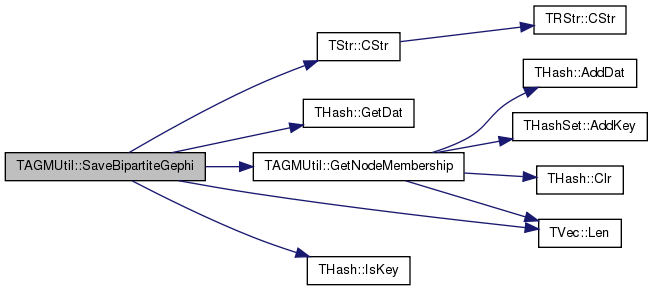
| static void TAGMUtil::SaveGephi | ( | const TStr & | OutFNm, |
| const PUNGraph & | G, | ||
| const TVec< TIntV > & | CmtyVVAtr, | ||
| const double | MaxSz, | ||
| const double | MinSz | ||
| ) | [inline, static] |
Definition at line 48 of file agm.h.
Referenced by SaveGephi().
{
THash<TInt, TStr> TmpH;
SaveGephi(OutFNm, G, CmtyVVAtr, MaxSz, MinSz, TmpH);
}

| static void TAGMUtil::SaveGephi | ( | const TStr & | OutFNm, |
| const PUNGraph & | G, | ||
| const TVec< TIntV > & | CmtyVVAtr, | ||
| const double | MaxSz, | ||
| const double | MinSz, | ||
| const THash< TInt, TStr > & | NIDNameH | ||
| ) | [inline, static] |
Definition at line 52 of file agm.h.
References SaveGephi().
{
THash<TInt, TIntTr> TmpH;
SaveGephi(OutFNm, G, CmtyVVAtr, MaxSz, MinSz, NIDNameH, TmpH);
}

| void TAGMUtil::SaveGephi | ( | const TStr & | OutFNm, |
| const PUNGraph & | G, | ||
| const TVec< TIntV > & | CmtyVVAtr, | ||
| const double | MaxSz, | ||
| const double | MinSz, | ||
| const THash< TInt, TStr > & | NIDNameH, | ||
| const THash< TInt, TIntTr > & | NIDColorH | ||
| ) | [static] |
save graph into a gexf file which Gephi can read
Definition at line 408 of file agm.cpp.
References TUNGraph::BegEI(), TUNGraph::BegNI(), TStr::CStr(), TUNGraph::EndEI(), TUNGraph::EndNI(), THash< TKey, TDat, THashFunc >::GetDat(), GetNodeMembership(), THash< TKey, TDat, THashFunc >::IsKey(), TVec< TVal, TSizeTy >::Len(), TTriple< TVal1, TVal2, TVal3 >::Val1, TTriple< TVal1, TVal2, TVal3 >::Val2, and TTriple< TVal1, TVal2, TVal3 >::Val3.
{
THash<TInt,TIntV> NIDComVHAtr;
TAGMUtil::GetNodeMembership(NIDComVHAtr, CmtyVVAtr);
FILE* F = fopen(OutFNm.CStr(), "wt");
fprintf(F, "<?xml version='1.0' encoding='UTF-8'?>\n");
fprintf(F, "<gexf xmlns='http://www.gexf.net/1.2draft' xmlns:viz='http://www.gexf.net/1.1draft/viz' xmlns:xsi='http://www.w3.org/2001/XMLSchema-instance' xsi:schemaLocation='http://www.gexf.net/1.2draft http://www.gexf.net/1.2draft/gexf.xsd' version='1.2'>\n");
fprintf(F, "\t<graph mode='static' defaultedgetype='undirected'>\n");
if (CmtyVVAtr.Len() > 0) {
fprintf(F, "\t<attributes class='node'>\n");
for (int c = 0; c < CmtyVVAtr.Len(); c++) {
fprintf(F, "\t\t<attribute id='%d' title='c%d' type='boolean'>", c, c);
fprintf(F, "\t\t<default>false</default>\n");
fprintf(F, "\t\t</attribute>\n");
}
fprintf(F, "\t</attributes>\n");
}
fprintf(F, "\t\t<nodes>\n");
for (TUNGraph::TNodeI NI = G->BegNI(); NI < G->EndNI(); NI++) {
int NID = NI.GetId();
TStr Label = NIDNameH.IsKey(NID)? NIDNameH.GetDat(NID): "";
TIntTr Color = NIDColorH.IsKey(NID)? NIDColorH.GetDat(NID) : TIntTr(120, 120, 120);
double Size = MinSz;
double SizeStep = (MaxSz - MinSz) / (double) CmtyVVAtr.Len();
if (NIDComVHAtr.IsKey(NID)) {
Size = MinSz + SizeStep * (double) NIDComVHAtr.GetDat(NID).Len();
}
double Alpha = 1.0;
fprintf(F, "\t\t\t<node id='%d' label='%s'>\n", NID, Label.CStr());
fprintf(F, "\t\t\t\t<viz:color r='%d' g='%d' b='%d' a='%.1f'/>\n", Color.Val1.Val, Color.Val2.Val, Color.Val3.Val, Alpha);
fprintf(F, "\t\t\t\t<viz:size value='%.3f'/>\n", Size);
//specify attributes
if (NIDComVHAtr.IsKey(NID)) {
fprintf(F, "\t\t\t\t<attvalues>\n");
for (int c = 0; c < NIDComVHAtr.GetDat(NID).Len(); c++) {
int CID = NIDComVHAtr.GetDat(NID)[c];
fprintf(F, "\t\t\t\t\t<attvalue for='%d' value='true'/>\n", CID);
}
fprintf(F, "\t\t\t\t</attvalues>\n");
}
fprintf(F, "\t\t\t</node>\n");
}
fprintf(F, "\t\t</nodes>\n");
//plot edges
int EID = 0;
fprintf(F, "\t\t<edges>\n");
for (TUNGraph::TEdgeI EI = G->BegEI(); EI < G->EndEI(); EI++) {
fprintf(F, "\t\t\t<edge id='%d' source='%d' target='%d'/>\n", EID++, EI.GetSrcNId(), EI.GetDstNId());
}
fprintf(F, "\t\t</edges>\n");
fprintf(F, "\t</graph>\n");
fprintf(F, "</gexf>\n");
fclose(F);
}
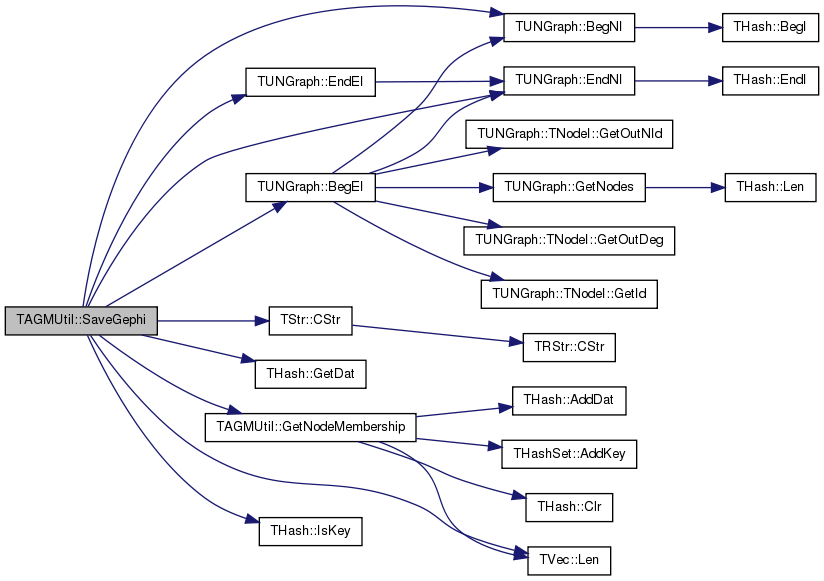
| int TAGMUtil::TotalMemberships | ( | const TVec< TIntV > & | CmtyVV | ) | [static] |
total number of memberships (== sum of the sizes of communities)
Definition at line 295 of file agm.cpp.
References TVec< TVal, TSizeTy >::Len().
